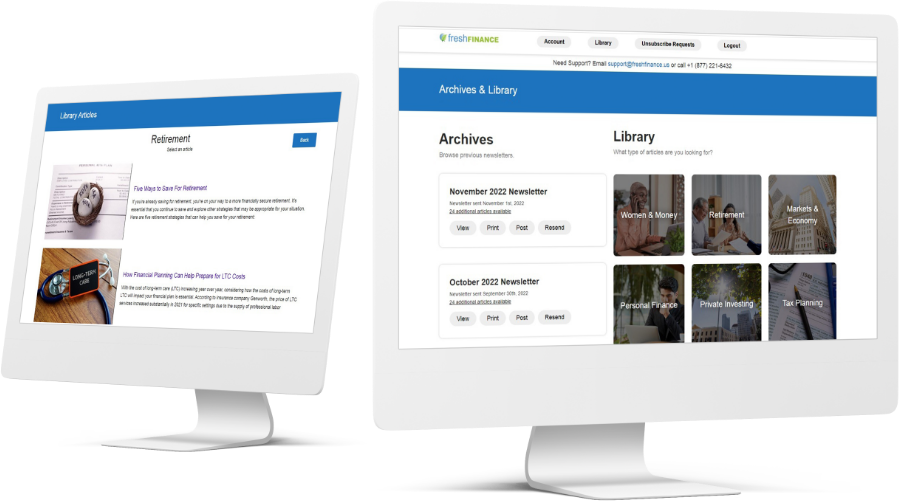Wealth organizations must recognize the importance of enterprise technology for marketing communications to propel their growth since it extends beyond merely creating fascinating written text. Marketing communications represent comprehensive actions to strategically disseminate your brand’s story, distribute financial education and other vital content, manage customer engagement, and ultimately drive the fulfillment of a strategic marketing communications strategy.
Building a case for licensing an enterprise content marketing solution may seem daunting. However, making your case to upper management becomes more straightforward once you determine the key factors to help cement your position on this vital technology. This article aims to unpack contributing factors and provide a roadmap for constructing an impactful case to sell your idea of licensing an enterprise marketing communications solution.
Understand Your Audience
Without an in-depth understanding of your audience, even the most robust enterprise content marketing solutions can fail to hit the mark. Use research to comprehend audience preferences and behaviors, such as the census of your advisors’ clients, client segmentation, and content marketing used by your organization’s competitors. This foundation enables you to communicate effectively with your audience.
Explore Solutions
After researching enterprise communication MarTech SaaS providers, contact each for a demo. Have your questions ready, which problems your organization has regarding communications, and how the solution may solve them. Above all, find out how the provider will support your organization. While pricing is important, service after the sale matters, too.
If part of your strategy is to replace solutions, seek technologies to consolidate your current ones. Often, firms use multiple non-integrated solutions, which wastes human capital due to ‘swivel chairing.’ If one solution can replace many, time and budget can be spared.
Examine Cross-Functional Collaboration
For a holistic and effective content marketing communications strategy, you must integrate organizational efforts. Whether sales, customer service, or HR, every department can provide valuable insights to ensure a powerful and seamless communication of your brand story.
If your organization has varying levels of marketing teams, seek input from all stakeholders to see if multiple marketers can use the solution as you build your case. Another consideration is who the solution is intended for; marketing teams, advisors, clients, and so on, and who can use it.
Craft Compelling Content
A consistent and strategic content schedule can significantly boost brand visibility and customer engagement. To make your case compelling, leverage new content ideas and formats that align with your brand attributes and audience preferences. Explore third-party content licensing and determine which enterprise platforms include content and tools within the solution. All these are vital to crafting content specific to your organization and industry.
Develop A Robust Marketing Communication Strategy
Your content marketing strategy should be flexible but rigorous, a marriage between creativity, organizational goals, and your chosen marketing technology solutions. Your strategy should identify the key themes and messages you want to promote and chart the channels, formats, and frequency for disseminating your content. Remember that an excellent strategy is not about selling but engaging and solving your client’s problems, demonstrated by your content.
Demonstrate How You Will Measure Performance
Validating your case for enterprise marketing communications software necessitates a robust evaluation framework. It’s essential to regularly track content performance against set objectives – from brand awareness to lead conversion. Qualitative and quantitative metrics help refine future strategies, prove the fulfillment of your efforts, and build your case more convincingly.
It’s vital to seek a solution that provides performance at the marketing team and advisor levels to make performance insights actionable.
Leverage Industry Best Practices
Refer to industry best practices and objective content marketing case studies to better persuade stakeholders and decision-makers. These examples provide time-tested strategies, lend credibility to your case, and highlight the potential outcomes. Be aware not to include case studies from only one source, such as website providers. After all, marketing communications technology differs significantly from these providers, so be sure to compare apples to apples, or so to speak.
Demonstrate Your Knowledge
It’s vital to illustrate how your content marketing efforts and knowledge will contribute to managing the overall goals of your communications strategy. Your experience is critical in establishing the validity of your recommendation of a specific enterprise solution, who will use it, and who will manage it.
Addressing these areas in your presentation to decision-makers can help you build a compelling case for recommending an enterprise communications solution. Remember that the journey to selecting a marketing communications solution is elaborate. Yet, the following outcomes – brand recognition, audience engagement, conversion, and loyalty – can catapult your organization to being a leader in your industry regarding marketing communications and financial education.


